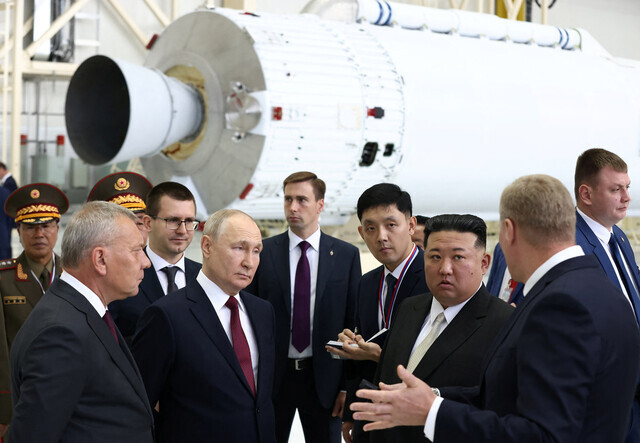hankyoreh
Links to other country sites 다른 나라 사이트 링크
[Column] Kim Jong-un’s long game after Ukraine


By Park Min-hee, editorial writer
Two years ago, on Feb. 24, 2022, Russia invaded Ukraine. This day marked the end of the world we once knew.
The brutal ongoing wars in Ukraine and the Gaza Strip are tearing the international order apart, and are heightening the risks of other wars breaking out across the globe.
Kim Jong-un, the leader of North Korea, has been the boldest in capitalizing on the ruptures appearing in the international order. Immediately after Putin commenced his invasion of Ukraine, Kim was the first to make it clear that North Korea stood with Russia.
After two years of conflict, Kim must consider himself a strategic genius. While the failure of his February 2019 summit in Hanoi with then-US President Donald Trump put Kim into a highly precarious position, now Kim believes that he is playing a winning game as he has entered a political climate that has never been so favorable to North Korea, prompting him to become bolder than ever.
In January, various US experts claimed that Kim had made the “strategic decision to go to war,” and North Korea fired artillery rounds toward the islands of Yeonpyeong and Baengnyeong, escalating fears of war and roiling financial markets.
Seoul’s defense minister, Shin Won-sik, who had boasted that South Korea would respond “swiftly, definitively and with great force” to North Korean provocations, quickly changed his tune, stating that a “barking dog doesn’t bite” to bolster his argument that North Korea would not go to war.
The rationale behind that assertion is that since North Korea is exporting millions of artillery shells to Russia — shells that it would need if it were preparing for war — there’s no chance of a war breaking out.
However, it is irresponsible of Shin and other members of the Yoon administration to underestimate the strategies of North Korea. It is also wrong for them to be so short-sighted and simplistic in thinking that everything is hunky dory so long as a war doesn’t break out tomorrow.
North Korea is playing the long game, looking more than a decade into the future. Kim’s strategy is to threaten the US with nuclear weapons affixed to intercontinental ballistic missiles (ICBMs) or submarine-launched missiles to deter the US from intervening on the Korean Peninsula. He also wants to threaten South Korea with tactical nuclear weapons and wait for an opportunity to take over the country by force, or turn it into a vassal state.
Given the overwhelming military and economic power of both South Korea and the US, this sounds like nothing more than a preposterous bluff.
But Kim only just turned 40 in January. He has no term limits to worry about. He is nurturing a grandiose dream of creating a strong nation that he can pass on to his 10-year-old daughter, Ju-ae, in 20 years.
At the Workers’ Party of Korea congress in January 2021, Kim ordered the development of new tactical nuclear weapons, and on Sept. 8, 2022, he promulgated the state policy on nuclear force, which specifies the conditions for the preemptive use of nuclear weapons.
In this context, Putin, mired in a protracted war in Ukraine, joined hands with North Korea. Since 2023, North Korea has rapidly strengthened its strategic cooperation with Russia, putting it in a very favorable position militarily, economically and diplomatically.
The international political scene is shifting in Kim’s favor, and he’s becoming emboldened by his country’s increasing closeness with Russia.
Meanwhile, the US has failed to restore order in both Ukraine and in Gaza. Rifts within the US-led international order continue to deepen.
If Donald Trump, who has declared that he would “encourage” Russia to attack any NATO member that failed to pay its defense bills as part of the Western military alliance, is re-elected as US president in November, it is hard to tell what will come of the US alliance system.
Another important variable for North Korea is how close it can rope in China. As of now, China is wary of how close Pyongyang-Moscow ties are getting, and is using its ability to keep North Korea “in check” as a bargaining chip with the US.
However, the more precarious the Taiwan issue becomes, the greater the strategic importance of North Korea becomes to China.
Kim is also opening the door to Japan. While Japan is playing up finding a resolution to the issue of North Korea’s abductions of Japanese citizens as a pretext for dialogue with Pyongyang out of domestic political constraints, behind this discourse, it knows that it must open channels of dialogue with the North to reduce the security risks it faces from North Korea’s increasingly dangerous nuclear and missile programs.
The US is also supportive of Japan’s endeavor to engage in dialogue with North Korea as a means to keep North Korea in check. North Korea will continue to send signals to Japan for dialogue in order to isolate South Korea.
North Korea is playing the long game by reading the comprehensive flow and shifts in the international order as well as the situation on either side of Eurasia.
Since the beginning of the year, it has been warning of provocations in the waters north of the islands of Yeonpyeong and Baengnyeong, and will continue to raise the level of threats issued to South Korea. South Korea will have more than enough time and capability to prepare for those threats if the country analyzes the international political situation accurately, develops a sophisticated strategy, and builds its self-reliance.
An intricate strategy that will shift Kim’s goals to those of “peaceful coexistence” is needed.
However, if the Yoon administration continues to call for “peace through (US) strength” while underestimating Pyongyang and remaining hung up on the North Korea collapse scenario, all the hopes and abilities that South Korea fosters will be shot down.
Please direct questions or comments to [english@hani.co.kr]

Editorial・opinion
![[Guest essay] Preventing Korean Peninsula from becoming front line of new cold war [Guest essay] Preventing Korean Peninsula from becoming front line of new cold war](https://flexible.img.hani.co.kr/flexible/normal/500/300/imgdb/original/2024/0507/7217150679227807.jpg) [Guest essay] Preventing Korean Peninsula from becoming front line of new cold war
[Guest essay] Preventing Korean Peninsula from becoming front line of new cold war![[Column] The state is back — but is it in business? [Column] The state is back — but is it in business?](https://flexible.img.hani.co.kr/flexible/normal/500/300/imgdb/original/2024/0506/8217149564092725.jpg) [Column] The state is back — but is it in business?
[Column] The state is back — but is it in business?- [Column] Life on our Trisolaris
- [Editorial] Penalties for airing allegations against Korea’s first lady endanger free press
- [Editorial] Yoon must halt procurement of SM-3 interceptor missiles
- [Guest essay] Maybe Korea’s rapid population decline is an opportunity, not a crisis
- [Column] Can Yoon steer diplomacy with Russia, China back on track?
- [Column] Season 2 of special prosecutor probe may be coming to Korea soon
- [Column] Park Geun-hye déjà vu in Yoon Suk-yeol
- [Editorial] New weight of N. Korea’s nuclear threats makes dialogue all the more urgent
Most viewed articles
- 1Yoon’s broken-compass diplomacy is steering Korea into serving US, Japanese interests
- 2[Guest essay] Preventing Korean Peninsula from becoming front line of new cold war
- 360% of young Koreans see no need to have kids after marriage
- 4[Reporter’s notebook] In Min’s world, she’s the artist — and NewJeans is her art
- 5S. Korean first lady likely to face questioning by prosecutors over Dior handbag scandal
- 6AI is catching up with humans at a ‘shocking’ rate
- 7‘Weddingflation’ breaks the bank for Korean couples-to-be
- 8Japan says it’s not pressuring Naver to sell Line, but Korean insiders say otherwise
- 9[Column] The state is back — but is it in business?
- 10Lee Jung-jae of “Squid Game” named on A100 list of most influential Asian Pacific leaders